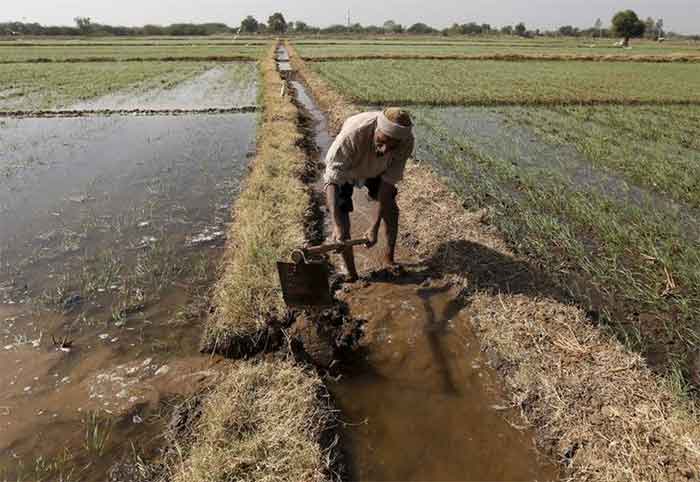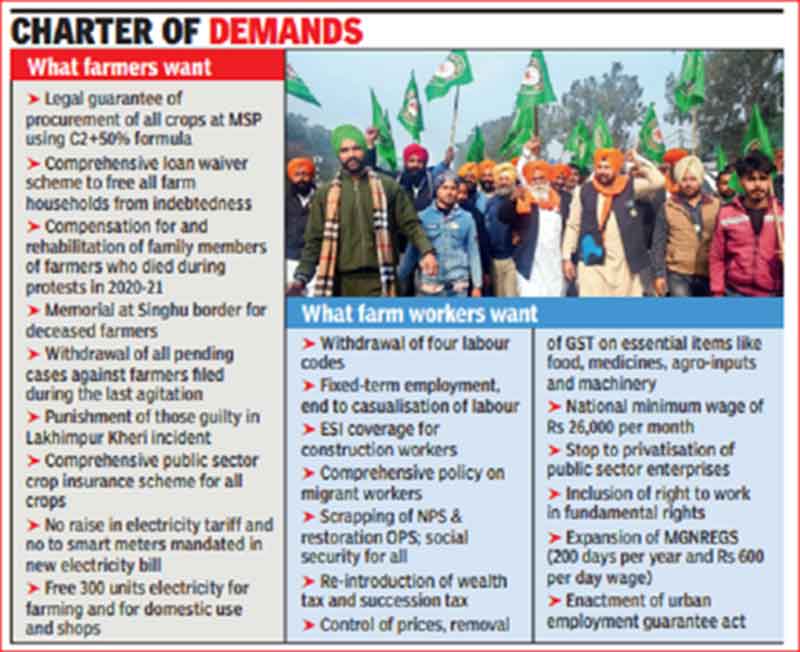
Farmers have been protesting in Delhi for three-and-a-half months over three agricultural laws passed by Parliament. Farmers’ organizations say the laws are for the benefit of corporates. Once these laws are enacted, corporates will not only be able to easily purchase farm produce, but will also be able to enter into contracts as required and purchase and store the products themselves. This speculation of the farmers’ associations seems to be largely true, as corporates have increased their share of the food and grocery markets in the last few years, while many scholars suggest that the combined market share of these two sectors will increase in the coming years. It will also increase the interference in the online market.
On July 17, 2019, the United States Department of Agriculture’s Foreign Agricultural Services (USFD) released a report on ‘Retail Sector Expansion High Value Products’ in India’s retail sector. It said that food processing, importers, wholesalers, retailers, food service directors are all associated with India’s growing agricultural market. India’s food and grocery retail market is the third largest in the world. It has an annual turnover of 500 billion (about Rs 36.50 lakh crore). The retail market is currently dominated by traditional shops such as street-corner shops or grocery stores, the report said. Their share is 98 per cent, while new and modern markets like supermarkets account for 2 per cent. The report also said that the market share of the modern market will double by 2020. According to some independent private observers, India’s retail sales will grow by 60 per cent by 2023 and reach बाजार 600 billion.
In fact, such reports about other countries are often issued by the US FDA, so that American traders can find business opportunities in other countries for themselves based on these reports. The report urges American traders to find a market for themselves in the food and grocery sector in India. The report also said that Reliance Group, India’s largest food retailer, wants to expand its presence in the traditional grocery market through the digital wholesale market.
The trend of e-commerce in India has increased in the last few years. It is constantly increasing. The online market is growing significantly. This proportion has increased significantly, especially during Covid-19. In September 2020, market research and advisory firm Redsare published a report entitled “Online grocery: What brands need to know?” Lockdown and Kovid-19 have led to a 73 per cent increase in e-grocery. Sales of fresh vegetables and fruits increased by 144 per cent, while sales of FMCG products (such as packaged flour, cereals, maggi, milk, oil, biscuits, etc.) increased by 150 per cent.
This growth in online sales has caught the attention of large corporate groups in this market. Reliance is prominent in this. According to the report, India’s online grocery market was valued at 1.98 billion in 2019, which could increase to. 18.2 billion by 2024. And the biggest beneficiary is going to be Reliance. Ambani has recently partnered with Facebook and acquired Future Retail (Big Bazaar, Easy Day Club and FBB), the company that runs the retail store chain. Apart from this, big companies like Flipkart, Amazon, Swiggy, Zomato, Dunjo etc. will also get the benefit of online shopping.
The India Brand Equity Foundation, under the Union Ministry of Commerce and Industry, oversees the business activities of the industry. According to him, e-commerce company Amazon has announced an investment of 515 million in the retail sector over the next five years. Parle Agro Pvt Ltd aims to increase its annual revenue from Rs 2,800 crore to Rs 5,000 crore. US food company Cargill Inc. aims to reach 8 lakh retail outlets and has included its oil brand Sunflower among the three largest brands in the country. Nestle India has announced to start its factory in Gujarat at a cost of Rs 700 crore. Haldiram has signed an agreement with Amazon in November 2019. In November 2020, Hindustan Unilever, India’s largest FMCG company, launched a product called ‘Nature Protect’. Silver Lake, a US-based private equity firm, has announced an investment of Rs 7,500 crore in Reliance Retail in September 2020. Earlier, Silver Lake had invested about 12,000 million on the Geo platform.
In March 2018, the US Department of Agriculture released a report on the food processing industry. Accordingly, the share of the organized sector in the food processing sector in India will also increase. According to the report, citing the Assocham and Grant Throton study, India will invest ३३ 33 billion in food and beverage production by 2024. Leading food processing companies in India include Nestle India, Britannia Industries, Amul India, Parle Agro, Haldiram and ITC.
This report clearly shows how fast the packet based food business is growing in India. It said that 19.25 lakh tonnes of rice, pasta and noodles were sold in 2013, up from 31.4 lakh tonnes in 2017. Breakfast increased by 89 per cent, oil and fat by 93 per cent, processed meats by 77 per cent, seafood and prepared meals by 74 per cent. This suggests that the possibilities for organized and online business in the agro-related industries in India are constantly increasing and that agricultural legislation will be instrumental in accelerating these possibilities.
The concern of the farmers is that once the agricultural laws come into force, the corporate world will get a complete relief and we will have to bear the brunt of it. Adani and Reliance are currently the two target corporate groups. Of course, the two groups have stated in a separate statement that they are not benefiting from agricultural legislation, but the way the two groups have prepared for the food and retail sector over the past two years makes it clear that they will dominate the food and grocery market in the coming years. .
India’s packaged edible oil business has grown rapidly, with Adani Wilmer accounting for about 20 per cent. Adani Group and Wilmer International have a 50:50 stake in the company. The company sells Fortune Soybean, Fortune Sunflower, Fortune Cotton Seed Oil. In addition, she has started a business of pulses, sugar, gram flour with soy, basmati rice, wheat flour and ready-to-cook (ready-to-cook) super food porridge. Apart from this, Adani Group also buys and sells apples from farmers in Himachal.
At the same time, Reliance Industries has been selling agricultural products for a long time. The company has been operating under the name ‘Reliance Retail’ since 2006. There are more than 797 stores across the country under the name ‘Reliance Fresh’. According to the company’s website, the stores sell 200 tonnes of fruits and 300 tonnes of fresh vegetables daily. Reliance Retail buys from farmers and small retailers under the ‘farm-to-fork’ model, which delivers food ‘directly from the farm to the house’. According to Reliance Industries Limited’s 2012-20 Annual Report, the company will increase the number of groceries as well as groceries in the Geo Mart online portal. The company also plans to launch the Geo Agriculture app. Through this app, farmers will be connected to Reliance Retail.
The biggest concern of farmers is ‘contract farming’. Sukhpal Singh, chairman and professor of the Center for Management in Agriculture at the Indian Institute of Management (IIM), Ahmedabad, says that contract farming has been going on in India for the last 30 years. Many farmers in Punjab and Haryana have benefited from it, but it cannot be said that it will benefit all farmers.
The first requirement for ‘contract farming’ is large farmland. At least five acres of land, also irrigated. Secondly, a written agreement has to be made between the farmer and the contractor. But unfortunately not all farmers are well educated. This can lead them astray. But one thing is clear, small farmers will not benefit from ‘contract farming’. As a result, one day they will have to sell their land.
Vikas Parashram Meshram is working in the development sector














































